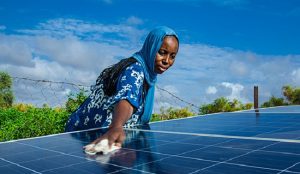By its Resolution A/77/327, the General Assembly of the United Nations declared Jan. 26 as the International Day of Clean Energy to serve as a call to raise awareness.

The UN also seeks to use the opportunity to mobilise action for a just and inclusive transition to clean energy for the benefit of people and the planet.
The International Renewable Energy Agency (IRENA), a global intergovernmental agency established in 2009 to support countries in their energy transitions, was also founded on Jan. 26, 2009.
Among other things, IRENA serves as a platform for international cooperation and provides data and analyses on clean energy technology, innovation, policy, finance and investment.
According to the UN Environment Programme (UNEP), the best time to adopt clean energy was yesterday and the next best time is today because adopting clean energy is fundamental to the fight against climate change.
“A large chunk of the greenhouse gases that blanket the Earth and trap the Sun’s heat are generated through energy production, by burning fossil fuels (oil, coal, and gas) to generate electricity and heat,” it said.
The UNEP also said the world needs to completely end its reliance on fossil fuels and invest in alternative sources of energy that are clean, accessible, affordable, sustainable, and reliable.
“Renewable energy sources – which are available in abundance all around us, provided by the sun, wind, water, waste, and heat from the Earth – are replenished by nature and emit little to no greenhouse gases or pollutants into the air.”
It is impossible to turn a blind eye to the threat of climate change, with devastating natural disasters in many parts of the world.
From deadly heat waves to fatal mudslides; unrelenting floods to raging wildfires, the world keeps experiencing extreme weather conditions that scientists say are climate change-related.
According to the UN, fossil fuels, coal, oil, and gas, are responsible for nearly 90 per cent of global carbon dioxide emissions. Unfortunately, they still dominate global energy production.
Although significant progress is being made, renewable sources of energy, such as wind, solar, hydro, and geothermal, still only power about 29 per cent of electricity worldwide.
The Paris Agreement (or the Paris Accord), a legally binding international treaty on climate change adopted in 2015, was signed by 195 countries to cover climate change mitigation, adaptation and finance.
However, those three components – mitigation, adaptation and finance – seem to be exclusively within the reach of wealthy nations who, ironically, are the biggest polluters.
For instance, a 2022 report by IRENA, in collaboration with the African Development Bank (AfDB), indicted rich nations when it comes to just and inclusive transition to clean energy.
The report showed that Africa has significantly been left out of the energy transition, as only 2 per cent of global investments in renewable energy in the last two decades were made in Africa.
According to the report, less than 3 per cent of global renewables jobs are in Africa.
“In Sub-Saharan Africa, electrification rate was static at 46 per cent in 2019 with 906 million people still lacking access to clean cooking fuels and technologies.”
This damning revelation is despite Africa’s huge resource potential in wind, solar, hydro, and geothermal energy.
Speaking on “Harnessing Africa’s renewable energy potential” at the Africa Climate Summit (ACS) in 2023, AfDB President, Dr Akinwumi Adesina, underlined Africa’s tremendous potential in energy which remains untapped.
“Africa has an almost unlimited potential of solar capacity (11 TW); abundant hydro (350 GW), out of which only 5-6 per cent is being harvested; wind (110 GW), of which only 2 per cent is being used; and geothermal energy sources (15 GW).
“This is not acceptable. We must make sure we achieve universal energy access, optimising and maximising the potential that Africa has, including natural gas, which is a great part of the energy mix,” he said.
Climate advocates say the impact of climate change on developing countries, especially in Africa, is an indication that the support, funding and awareness required for adaptation needs have been inadequate.
IRENA said COP28, held in Dubai, provided a unique opportunity to take stock of the global solutions for limiting global temperature rise to 1.5 degrees and to advance a positive, action-orientated energy agenda.
The conference agreed to triple renewable energy capacity globally and double the global average annual rate of energy efficiency improvements by 2030.
However, some stakeholders warn that if a just and inclusive transition to clean energy is not prioritised, regions that pollute less but are in more danger would have to make other economic choices.
On this year’s International Day of Clean Energy, the world is reminded that with six years remaining to achieve the Sustainable Development Goals of the 2030 Agenda, 600 million people in Africa still lack access to electricity.
Also, about 970 million people in the continent lack access to clean cooking, with about 300,000 women dying every year trying to cook a meal.
As French President Emmanuel Macron said at the ACS, “No country should have to choose between fighting poverty and protecting the planet.”
By Kayode Adebiyi, News Agency of Nigeria (NAN)
